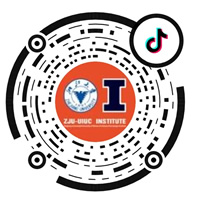Recently, the Ministry of Culture and Tourism announced the evaluation results of the Key Special Program under the "Cultural Technology and Modern Service Industry" Category of the National Key R&D Program. The project "Technology and Service Platform for Personalized and Inclusive Childcare Services", led by Professor Wang Hongwei, Vice Dean of Zhejiang University-University of Illinois Urbana-Champaign Institute (ZJUI), was successfully approved.
Recommended by the Zhejiang Provincial Department of Culture and Tourism, this project is led by Zhejiang University and jointly applied for with other strong institutions in related fields, including the Capital Institute of Pediatrics, China Population and Development Research Center, Guangzhou Medical University Affiliated Women’s and Children’s Medical Center, Shanghai Jiao Tong University, China Mobile (Zhejiang) Innovation Research Institute, Hangzhou Hele Technology Co., Ltd., Xi’an Jiaotong University, Hangzhou Zhisuan Technology Co., Ltd., and Putian Digital Health City Technology Co., Ltd.
In recent years, society has shown widespread concern for building an inclusive childcare service system, with support for developing various models—including employer-sponsored childcare, community-embedded childcare, and family childcare centers. This system serves as a key underpinning for advancing high-quality population development.
The project "Technology and Service Platform for Personalized and Inclusive Childcare Services" focuses on how to use digital and intelligent technologies to support new childcare models, with an emphasis on solving three key issues that urgently need to be addressed in inclusive childcare:
First, inclusive and homogeneous childcare. Through digital and intelligent means, it realizes the organic integration of the homogeneous supply of inclusive childcare services and the personalized development of children, and constructs a new childcare service model that combines medical care with childcare and involves multi-stakeholder collaboration.
Second, scientific and precise childcare. Relying on full-process, cross-modal active monitoring technology, a scientific and precise system for personalized childcare assessment and intervention will be established.
Third, safe and reassuring childcare. Under the framework of multi-stakeholder collaborative supervision, a safety guarantee mechanism covering all scenarios of childcare will be built.

▲ Schematic Diagram of Project Task Decomposition Framework
To address the aforementioned key issues, this project focuses on advancing technologies for personalized and inclusive childcare services. By establishing a digital and smart service platform framework, it explores full-cycle inclusive childcare services that integrate the "integration of medical care and childcare" and "digital childcare," and develops a new childcare model that combines inclusive standardization with personalized development.
This model effectively addresses infant families’ hesitancy to entrust their children and inability to afford care, fosters a reassuring inclusive childcare environment, and advances the balanced development of regional early childhood education. It also provides comprehensive model, technical, and systemic support to enhance the quality of life and developmental potential of infants across China and beyond—holding great value for both technological R&D and public welfare applications.
Led by Professor Wang Hongwei, the team brings nearly 200 researchers from the 10 aforementioned institutions to jointly develop a digital intelligence-driven childcare service system and supervision system, and conduct application demonstrations. ZJUI faculty and students are a key part of the team, including Associate Professor Zhao Bo, Assistant Professors Wang Gaoang, Zhang Meng, and Meng Xiangming, plus 16 doctoral and 23 master’s students. In recent years, Professor Wang’s team has focused on research in areas like signal processing and computer vision, consistently producing high-level work in top conferences and journals across computer-related disciplines-highlighting the strong academic strength and high international influence of ZJUI faculty and students in these fields.
Recent years have seen ZJUI systematically advance organized research, steadily strengthen its interdisciplinary advantages, and prioritize young faculty development—gradually building a sustainable system with the coordinated development of education, science and technology, and talents. The approval of this National Key R&D Program project is highly significant for boosting ZJUI’s high-quality research growth and facilitating the application of high-level outcomes to serve society. It marks another major breakthrough in the Institute’s research project applications, building on its earlier success in securing the Pilot Project of the National Natural Science Foundation of China’s (NSFC) Research Fund for Foreign Senior Scholars.

Wang Hongwei
Professor
Dr. Wang Hongwei is a Tenured Professor and Doctoral Supervisor at Zhejiang University. He serves as Vice President and Secretary-General of the Electronics and Information Branch of Zhejiang Overseas High-Level Talents Association, Associate Editor and Editorial Board Member of international journals IET Collaborative Intelligent Manufacturing and Service Oriented Computing and Applications, as well as Chair of sub-forums for multiple high-level international conferences such as IEEE CSCWD and IEEE ICEBE.
His research interests lie in knowledge mining and knowledge engineering, and their applications in the design, analysis, manufacturing, and maintenance of complex systems. In recent years, he has focused on research in natural language processing, industrial knowledge graphs, vertical domain large model technologies, and multimodal learning. He has published over 200 academic papers, including more than 60 in top journals such as IEEE Transactions on Services Computing, IEEE Transactions on Neural Networks and Learning Systems, and IEEE Transactions on Industrial Informatics, as well as in top conferences such as CVPR, ACL, SIGKDD, SIGIR, ICML, ICLR, AAAI, and IJCAI. He has also published two academic monographs and won more than 10 academic honors, including Best Paper Awards at high-level international conferences.







